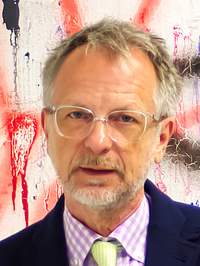University Medical Center (UMC) Mainz
Maria Felicia Basilicata Christian Behl Benedikt Berninger Luciana Berod Tobias Bopp Andreas Daiber Sven Danckwardt Carsten Deppermann Stephan Grabbe Thomas Hofmann Daniela Kramer Daniela Krause Dilja Krueger-Burg Michael Kühn Beat Lutz Johannes Mayer Wolfram Ruf Katrin Schäfer Susann Schweiger Natalia Soshnikova Tim Sparwasser Oliver Tüscher Sara Vieira-Silva Ari Waisman Philipp Wild Jennifer Winter Fatemeh Zare-ShahnehSelective autophagy during cell stress and ageing

Macroautophagy (autophagy) is a highly conserved degradation and recycling mechanism that ensures cellular quality control and homeostasis to allow proper cell function, integrity and healthy ageing. Autophagy degrades proteins and protein aggregates, damaged organelles and a vast variety of other cellular components via vesicular sequestration and subsequent lysosomal digestion. Under stress conditions such as nutrient deprivation, oxidative or proteotoxic stress and DNA damage, autophagy is rapidly upregulated to meet the cell’s homeostatic demands. Dysregulation of autophagy is linked to various diseases including cancer and neurodegeneration. Our group investigates several selective autophagy pathways, including aggrephagy (autophagic degradation of aggregated proteins) and ER-phagy (autophagic degradation of ER fragments), in the context of neurodegeneration and ageing. In previous studies, we have shown that in response to cell stress and during ageing, the HSP70 co-chaperone BAG3 specifically targets aggregation-prone proteins to the perinuclear aggresome and promotes their degradation via BAG3-mediated selective autophagy. Currently, we are focusing on elucidating the exact mechanism that governs the aggrephagy pathway.
Positions held
- Since 2010: Director, Institute of Pathobiochemistry, University Medical Center, Johannes Gutenberg University (JGU) Mainz, Germany
- 2005-2010: Director, Interdisciplinary Center for Neurosciences, JGU Mainz, Germany
- 2003-2008: Executive Director, Institute of Physiological Chemistry and Pathobiochemistry, JGU Mainz, Germany
- Since 2002: Full Professor (C4) of Pathobiochemistry and Chair of the Institute of Pathobiochemistry, University Medical Center, JGU Mainz, Germany
- 1997-2002: Head (C3, Assistant Professor level) of an Independent Max Planck Society Research Group, MPI of Psychiatry, Munich, Germany
- 1994-1996: Research Scientist, Head of the Steroidpharmacology Group, MPI of Psychiatry, Munich, Germany
- 1992-1994: Postdoctoral Researcher with Dave Schubert, Salk Institute for Biological Studies, La Jolla, USA
- 1991-1992: Postdoctoral fellow with Ulrich Bogdahn, Department of Neurology, Julius Maximilian University of Würzburg, Germany
Education
- 1999: Habilitation in Experimental Neurology and venia legendi, Ludwig Maximilian University of Munich, MPI of Psychiatry, Munich, Germany
- 1991: Dr. rer. nat. in Neurobiology with Prof. E. Buchner, Prof. U. Bogdahn, Julius Maximilian University of Würzburg, Germany
- 1988: Diploma in Biology, Julius Maximilian University of Würzburg, Germany
Selected publications by Christian Behl
Körschgen H, Baeken M, Schmitt D, Nagel H, Behl C (2023). Co-chaperone BAG3 enters autophagic pathway via its interaction with LC3B.Traffic, in press. doi: 10.1111/tra.12916
Schmitt D, Bozkurt S, Henning-Domres P, Huesmann H, Eimer S, Bindila L, Behrends C, Boyle E, Wilfling F, Tascher G, Münch C, Behl C, Kern A. (2022) Lipid and protein content profiling of isolated native autophagic vesicles. EMBO Rep. 23(12):e53065. doi: 10.15252/embr.202153065. Epub 2022 Oct 10. Link
Hiebel C, Stürner E, Hoffmeister M, Tascher G, Schwarz M, Nagel H, Behrends C, Münch C, Behl C. (2020) BAG3 Proteomic Signature under Proteostasis Stress.Cells. 2020 Nov 4;9(11):2416. doi: 10.3390/cells9112416. Link
Christ MG, Clement AM, Behl C. (2020) The Sigma-1 Receptor at the Crossroad of Proteostasis, Neurodegeneration, and Autophagy. Trends Neurosci. 2020 Feb;43(2):79-81. doi: 10.1016/j.tins.2019.12.002. Epub 2020 Jan 6. PMID: 31918966. Link
Gamerdinger M, Hajieva P, Kaya AM, Wolfrum U, Hartl FU, Behl C. (2009) Protein quality control during aging involves recruitment of the macroautophagy pathway by BAG3. EMBO J. 28(7):889-901. doi: 10.1038/emboj.2009.29. Epub 2009 Feb 19. Link